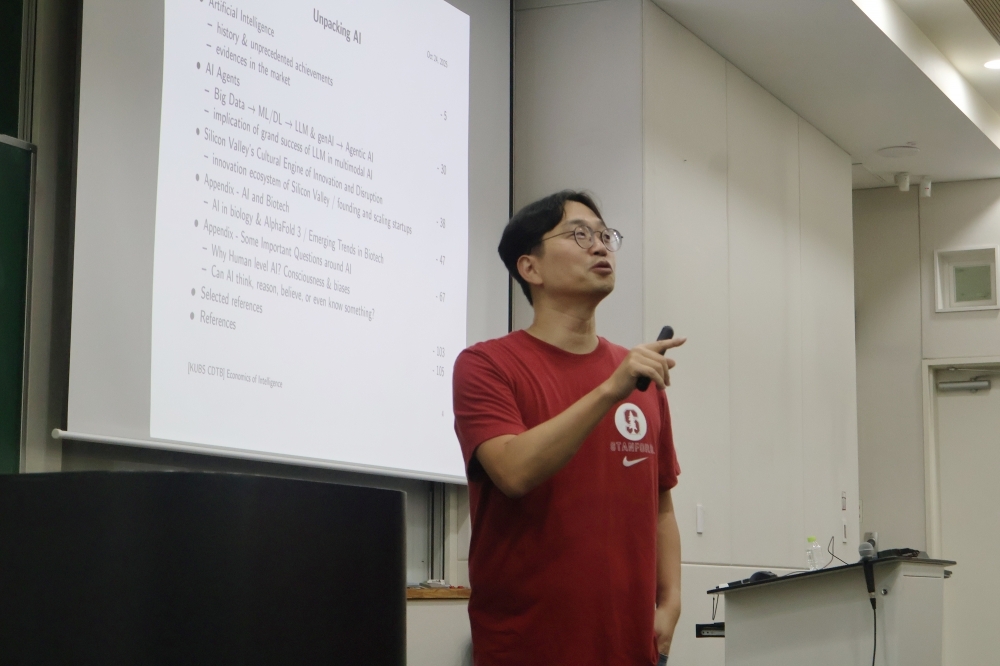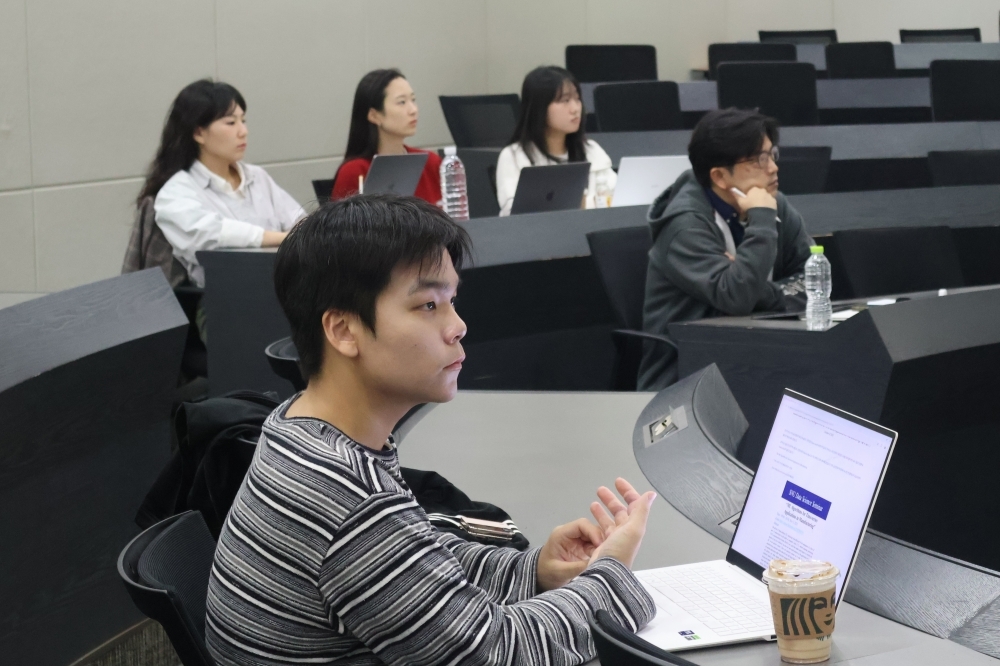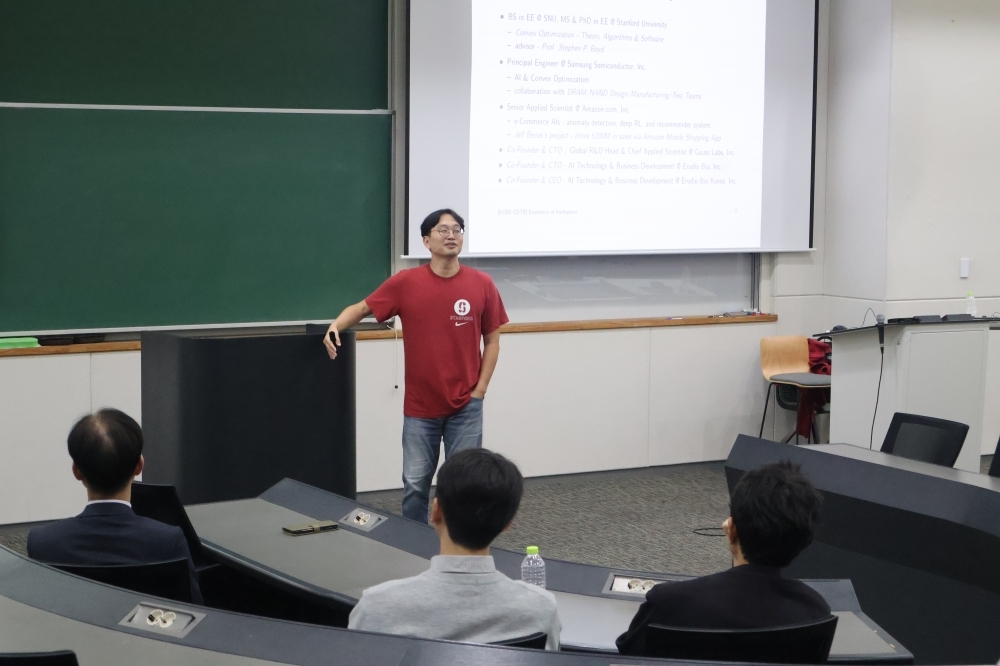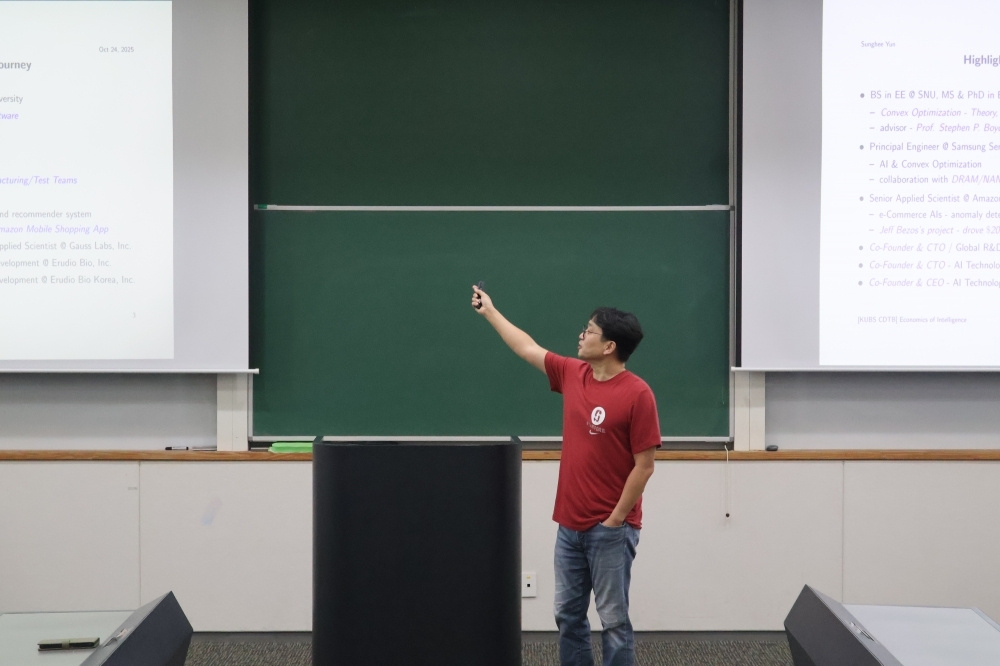News
KUBS News
Korea University CDTB Hosts DTB Seminar on `‘Evolution and Insights in the Age of AI’
2025.11.03 Views 1137 국제실
Korea University CDTB Hosts DTB Seminar on ‘Evolution and Insights in the Age of Artificial Intelligence’

The Center for Digital Transformation & Business (CDTB) at Korea University held its DTB Seminar on Friday, October 24. The DTB Seminar is a program that invites four speakers each semester to provide students with opportunities to explore the latest digital technologies and industry trends. This session featured CEO Sunghee Yoon, who earned his bachelor’s degree in Electrical Engineering from Seoul National University and his master’s and doctoral degrees in Electrical Engineering from Stanford University. CEO Yoon currently leads Erudio Bio, an artificial intelligence (AI) company that provides AI consulting services to domestic and global firms, including SK and Amazon, while also serving as an adjunct professor at Sogang University.
Yoon began his lecture by tracing the origins of computer history. He explained that when the vacuum-tube computer ENIAC first appeared, it was large enough to fill an entire classroom, yet its performance was only about one-billionth that of today’s mobile phones. “It may seem laughable now,” he remarked, “but at that time, people were astonished simply because such a massive machine could perform precise calculations and operate at remarkable speed.” Decades later, technology has advanced to levels that people in the past could never have imagined. Yoon noted that until deep learning began attracting attention in 2012, computers struggled even to distinguish between simple images of dogs and cats, as he outlined the developmental trajectory of artificial intelligence (AI). He added that AI has evolved through two major “winters”—periods of stagnation and disillusionment—before reaching its current stage of advancement.
The first “winter” was a period when distrust in the technology led to waning interest, while the second occurred after 2012, when deep learning began to rise but progress stalled due to the enormous costs involved. However, a major turning point came in 2017, when Google published the groundbreaking paper “Attention Is All You Need.” By introducing the concept of “attention” in place of the traditional sequential learning approach, this work enabled AI to achieve far greater levels of learning and application. In 2022, the era of large language models (LLMs) and generative AI began with the emergence of ChatGPT, and by 2024, AI had entered the era of autonomous “AI Agents.” Yoon noted, “Today’s AI has evolved to the point where it can learn from and process diverse forms of data—text, images, and videos—to generate creative outputs. This plays a crucial role in enhancing productivity and reducing labor costs.”

He went on to cite Moore’s Law as the underlying foundation of AI’s rapid advancement. “As the number of transistors integrated into semiconductor chips has doubled approximately every 18 to 24 months, computer performance has improved exponentially while prices have steadily decreased,” he explained. “The fact that today’s smartphone in your hand can perform far more functions than a computer that once filled an entire classroom is a clear example of this phenomenon.”
Yoon went on to note that similar examples of concentrated progress can also be found in the field of biotechnology. “The Human Genome Project was a study that took nearly ten years,” he said, “but AlphaFold, developed on the basis of deep learning technology, accomplished the same task in a much shorter period and was recognized with the Nobel Prize in Chemistry.” He added, “AI has drastically streamlined the process of testing hundreds of candidate compounds in drug development, significantly reducing both cost and time. This approach has become central to DNA analysis and the advancement of personalized medicine.” Yoon further remarked, “Since each patient responds differently to medication, we are exploring AI systems capable of identifying drugs tailored to individual responses.”

During the Q&A session, students posed a wide range of questions. One student asked, “Even when AI is given simple math problems, it often produces incorrect answers—or when its errors are pointed out, it merely changes inequality signs to make the answer seem more plausible. Why does AI make such basic mistakes or provide inaccurate answers?” Yoon explained, “Large language models do not truly understand the meaning of a question; instead, they function by predicting the most probable words within a given context.” He continued, “As a result, AI sometimes fabricates information that does not actually exist in an effort to produce convincing answers—a phenomenon known as ‘hallucination,’ one of AI’s most representative limitations.” With a touch of humor, he added, “It’s actually more surprising when a large language model gets a problem exactly right; its mistakes are, in a way, the more natural response,” eliciting laughter from the audience. When another student raised concerns about the negative impacts of AI—such as deepfakes and fraud—Yoon responded, “That’s a very important point.” He emphasized, “The ethical use of AI is not a technological issue but a human one, and going forward, both companies and individuals must uphold a higher standard of ethical responsibility.”

Yoon concluded his lecture by remarking, “Perhaps one of the most inaccurate predictions ever made on Wall Street was underestimating the speed of artificial intelligence’s growth,” emphasizing that the development of AI technology is advancing far faster than anyone had anticipated. He added, “Even based on the progress we’ve seen so far, AI has already surpassed the bounds of human imagination, and predicting its future trajectory is nearly impossible.” He continued, “In an era of such rapid transformation, what matters most is not the technology itself but our capacity to understand and respond to change.” He advised, “Future leaders must cultivate the ability to closely observe changes around them, discern the flow of progress, and respond proactively with insight.”
In this way, the seminar went beyond merely introducing the history or structure of AI technologies—it prompted participants to reflect on the broader social implications of technological advancement and the mindset individuals should adopt in this shifting landscape. Yoon’s lecture resonated deeply with students, conveying the message that “the age of AI should be met not with fear, but with preparation.” One student who attended the session shared, “Even though I’m not an engineering major, I found the lecture highly engaging because it offered various real-world examples.” The student added, “I was particularly struck by the fact that while the Human Genome Project initially drew global attention, it was ultimately completed not by human hands but by AI in a remarkably short period. It made me realize how sophisticated the technology behind ChatGPT, which I use every day, truly is.” They went on, “Rather than simply asking AI questions, I now want to better understand its mechanisms and characteristics so I can make more effective use of it.”
The Center for Digital Transformation & Business (CDTB) plans to continue organizing diverse seminars that help students gain an in-depth understanding of emerging digital technologies and industrial transformations, connecting this knowledge to both academic learning and practical application. Through this lecture, students not only learned about the principles of AI technology but also gained valuable insight into its philosophical dimensions and social implications.


